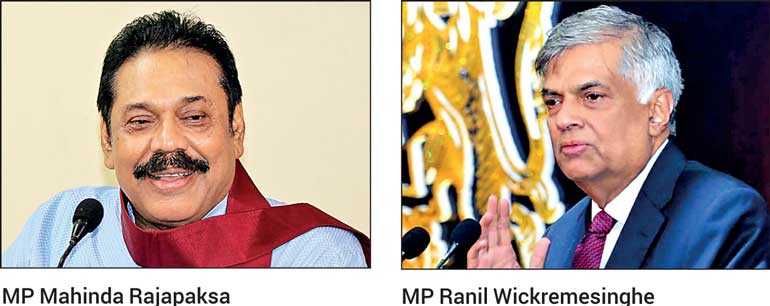Monday Feb 16, 2026
Monday Feb 16, 2026
Monday, 10 December 2018 00:00 - - {{hitsCtrl.values.hits}}

When you walk through a storm
Hold your head up high
And don’t be afraid of the dark
At the end of a storm
There’s a golden sky
And the sweet silver song of a lark
Walk on through the wind
Walk on through the rain
Though your dreams be tossed and blown
Walk on, walk on
With hope in your heart
And you’ll never walk alone.
‘You will never walk alone’ by Oscar Hammerstein II
Sri Lanka awaits the determination of the Supreme Court on the authority and sustainability of the President’s gazette notification dissolving Parliament and scheduling fresh elections to elect a new Parliament.
Holding elections is not democracy. Holding elections under the rule of law is democracy. Now, the President has told us how he expected our democracy to work.
In an interview he had explained why Mahinda Rajapaksa, his pick to replace Ranil Wickremesinghe, failed to garner the required 113 Members of Parliament.
The expected crossovers demanded more than Rs. 500 million to defect. He has in the same interview confessed that his nominee now did not command a majority in the 225-member Parliament despite claims that were made immediately after his surprise move on 26 October.

Democracy
Derived from the ancient Greek ‘demokratia’, democracy literally means power derived from the people. So let us get straight to the point. Democracy is too much Greek to our Gamarala.
But that should not lull us into complacency. Democracy also seems to be too much “Greek” to Gotabaya, Gamampila, Godahewa and a gargantuan gobbledygook galore disenchanted with the 19th Amendment.
Why did we enact the 19th Amendment? Gotabaya says that it was aimed at the Rajapakse family. Not quite accurate. The 19th Amendment repealed the obnoxious 18th Amendment that emasculated the independent commissions and perpetuated Rajapaksa family hegemony permitting dual citizens the luxury of discretionary patriotism.
The Sinhala Sunday Broadsheet ‘Sathi Aga Aruna’ published by the preeminent oligarch spawned during the decade of the Rajapaksa monolith has an interesting Editorial this Sunday. It is captioned ‘Bahu Bootha Yugayak’ – literal translation – An Age of Hocus Pocus.
The Editorial claims that the 19th Amendment has created the current crisis. In the three years since its enactment, the country has known nothing but chaos.
Newspapers are entitled to their opinions. But they are not entitled to their facts. The Editorial pleads for a national consensus to repeal the 19th Amendment which it claims, was enacted to serve a narrow political purpose.
Now we reach a critical point in the current brouhaha. This same oligarch was the preferred choice of Malik Samarawickrama to handle the UNP’s advertising and PR campaign during the last local government elections.
Ranil Wickremesinghe during a debate in Parliament accused the same oligarch of pump and dump activities in the stock market.
It is a strange world. Our liberties are in peril. Oligarchs are taking liberties with our gains of 8 January 2015 and they have patented liberty as a brand name and own plazas of liberty, courtesy of the urban remodelling czar.
Aristotle warned that the greed of oligarchs and resultant inequality would bring instability and make the republic into an oligarchy and an empire.
Plato feared that demagogues would misuse ‘free speech’ and install themselves as tyrants.
Making history or retooling democracy are never easy. The process of achieving both objectives is rarely pretty. That is an understatement. The process is ugly.
Creating a democracy without dismantling the oligarchy that sustained the earlier autocracy cum kleptocracy was an exercise of futility wrapped in fantasy.
Primary dealership of Perpetual Treasuries was authorised by a friendly governor of the Central Bank. That was oligarchy operating in the shadows. Under the good governance regime, the father-in-law was made governor of the Central Bank and it was now a great groovy gravy train. This essay is not about right and wrong or good, bad or ugly. This is an essay exploring the oligarchic grip of our democracy.
Oligarchic influence
Who are oligarchs? Oligarchs are a set of elites with enormous material resources to spend on securing and fortifying their privileged financial statuses, political interests and societal privileges.
Political scientist Jeffrey Winters defines their principal vocation as “wealth defence” and divides them into two categories. “Property defence” and “income defence”.
Our challenge in protecting the democratic gains of the 19th Amendment is to properly comprehend the linkage between the two realms occupied by the oligarchs - economic and the political.
A president lost in the no-man’s-land between the two realms openly speculates on the high cost of purchasing Members of Parliament. The poor man is totally out of his depth.
At its core occupation, an oligarchy involves concentrating economic power and using it for political purposes.
Wijeyadasa Rajapakshe, a principal mover and shaker of the project, is the mouthy piece on record for another Rajapaksa era oligarch – the avant-garde buccaneers of oceans unlimited.
We in pursuit of democratic ideals are vulnerable to the intrigues, machinations and mind manipulation of oligarchy because we are focused totally and unequivocally only on political equality. We overlook the indirect threat that emerges from economic inequality.
Under Rajapaksa rule oligarchs were embedded in the regime. Under the crony rule of the post 19th Amendment democracy, there emerged warring oligarchies. What was collective under Mahinda turned competitive under the Sirisena-Wickremesinghe duumvirate. No wonder it has incensed Maharajahs who were used to the kind of Sultanic oligarchies under President Premadasa as in Suharto’s Indonesia.
Such dog-in-the-manger oligarchies are rare but they do appear like rare comets. Now the poor ‘Gamarala’ is gazing into the sky in total wonderment at how the comet of such great promise vanished into nothingness with such terrible haste.
Oligarchs do not approve of the 19th Amendment because it makes for a level playing field. Oligarchs need a legal system that is skewed to work in their favour, so that their illegal behaviour rarely gets punished. And they sustain all of this by financing elections. Under the Rajapaksa regime and the 18th Amendment they had the best of two worlds - rule of law and word of one man. Under the 19th Amendment it is the rule of law pure and simple.
Oligarchy works because its leaders institutionalise their power through law, media, and political rituals. How can we change this terrible system? There is only one way out. We must create a more economically equal society.
The problem arises here and it explains the editorial demand in the ‘Sathi Aga Aruna’. Why should the oligarchs allow such policies that reduce their wealth and make society more equal. If they can keep the people divided, they have little to fear from the occasional protest or even a fast unto death.
There is hope. Oligarchic institutions are subject to rot and collapse, as all are human institutions. With our solidarity as we have demonstrated since 26 October, we can use this opportunity to bring government back to the people.
At such a point in time, the people will unite for long enough that their protests will lead to such power, that we may compel Parliament to adopt the 20th Amendment and abolish the abomination of the executive presidency by a referendum and a general election. The question before us is whether democracy will emerge from such an oligarchic breakdown – or whether the oligarchs will just strengthen their grasp on the levers of government.
These are strange times. Maharajah type oligarchs are hobnobbing with extreme patriotic demagogues.